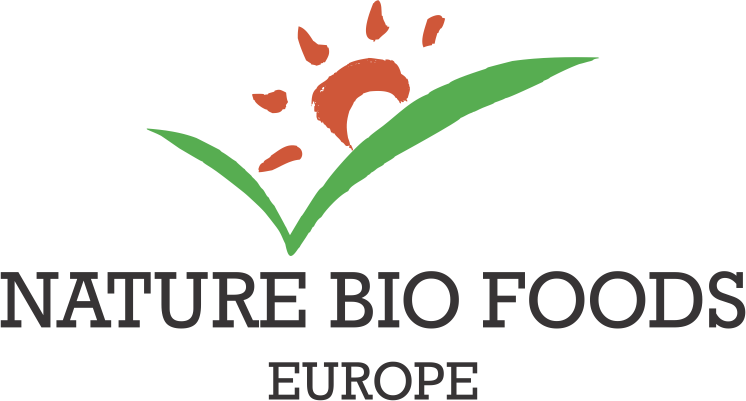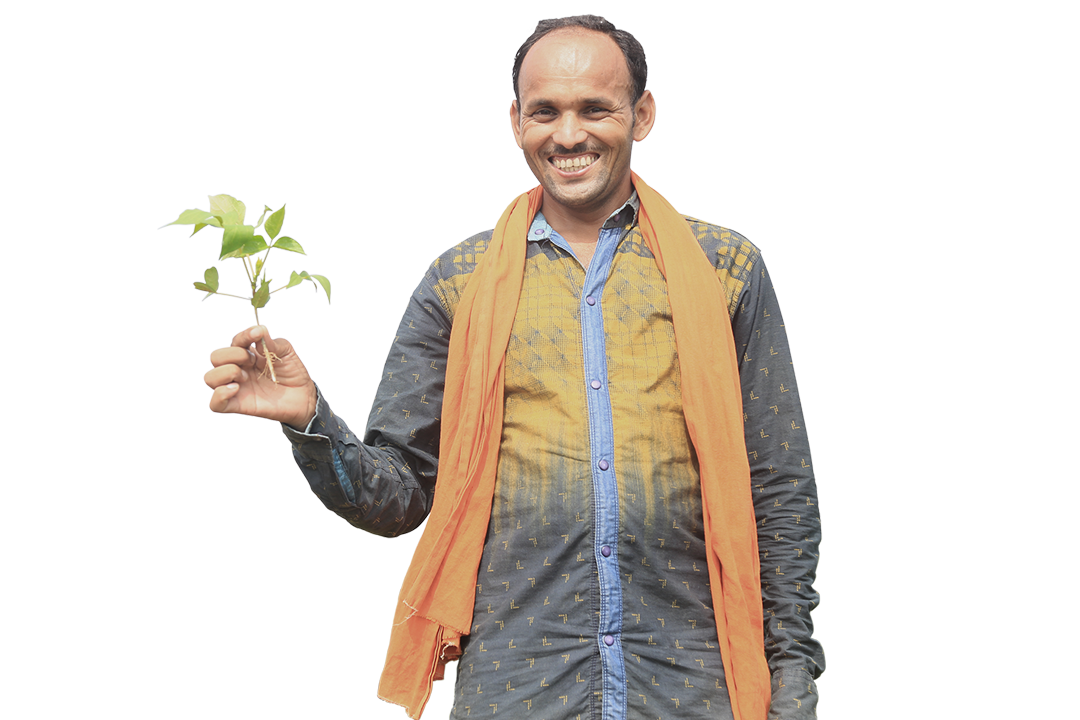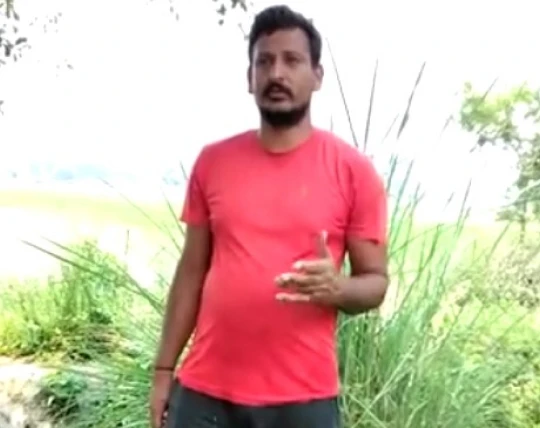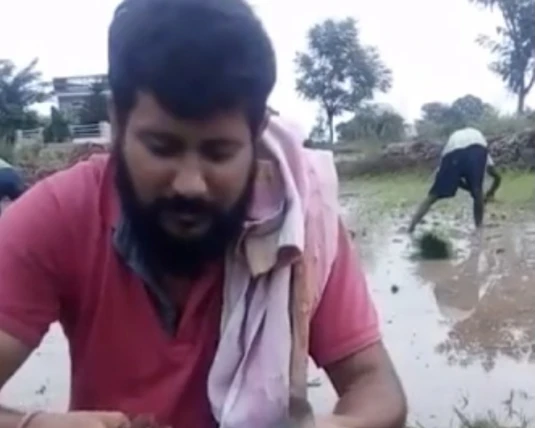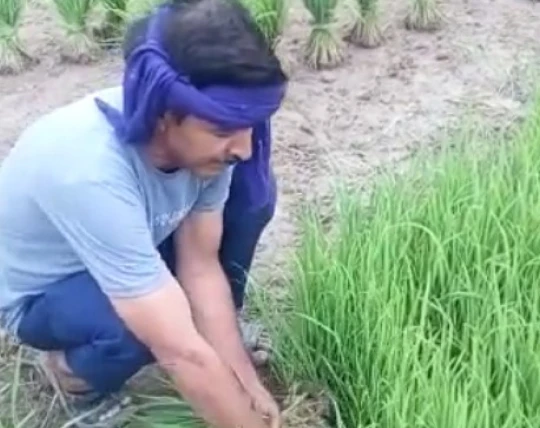Our farmers from Budaun, Uttar Pradesh cultivate a variety of organic and sustainably grown crops like Organic Basmati, Pearl Millet, Mustard, Sesame and more, which are then fine-graded and checked for quality assurance before distribution.
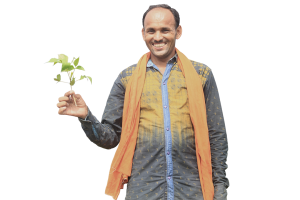

Nature Bio Foods’ Budaun project is dedicated to growing several crops using organic methods. The farmers in the region take charge of producing their own organic manure and green compost. The majority of the population residing in the rural area directly or indirectly relies on agriculture. Among the community, Yadavs are the most prominent with large land holdings and significant cattle population providing milk and manure for farming.
Budaun, with its origins dating back to 905 AD, is an agrarian town that upholds simple values. The farmers here are known for their dedication and hard work, and it is their association with Nature Bio Foods that drives the success of this project.
Organic Farms of Budaun, Uttar Pradesh
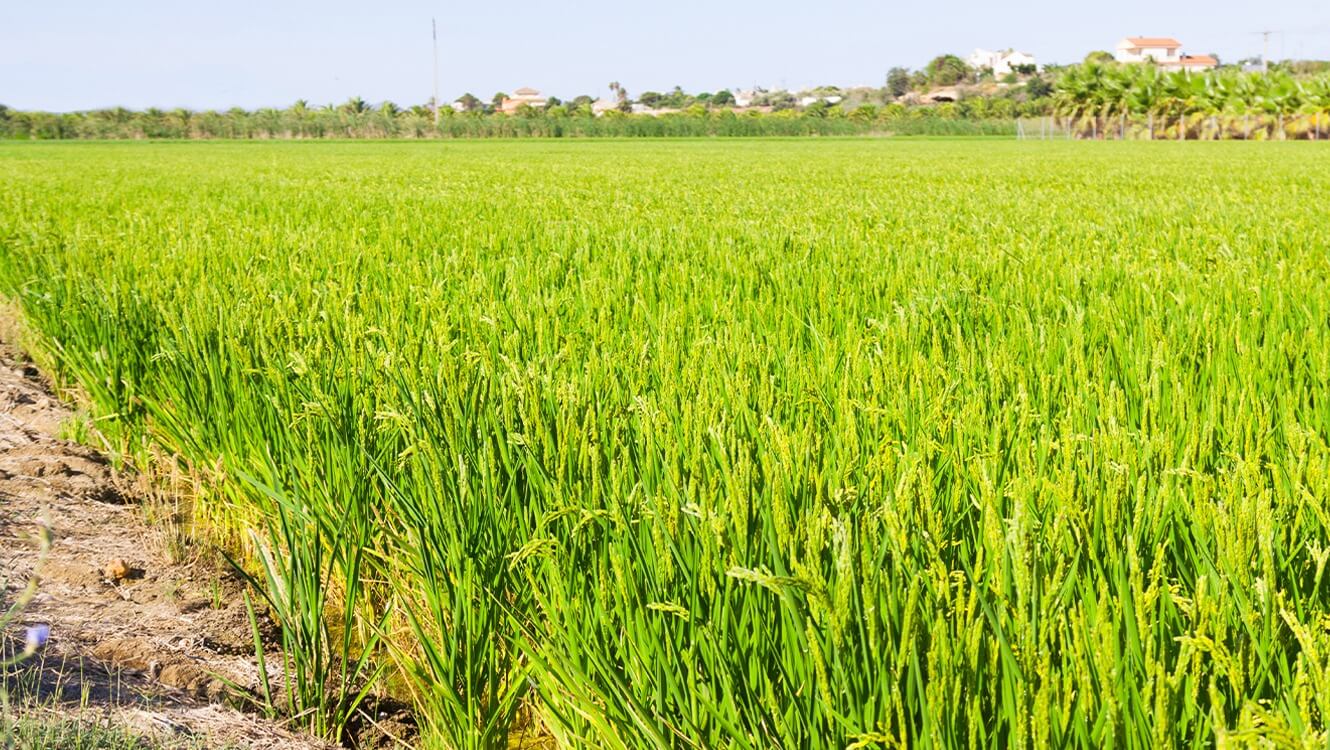

Location of the Project
The NBF project is located in the central region of Budaun, Uttar Pradesh, and borders the Shahjanpur district. This area is conveniently accessible, situated 300 km from Delhi, the capital of India, and 350 km from Lucknow, the capital of Uttar Pradesh. Budaun is a thriving agricultural trade center due to its fertile soil and prime location near the Soth river, a tributary of the Ganges.
Coordinates – The project’s coordinates fall between 79.13 and 79.65 longitude east and 27.71 and 28.01 latitude north.

Social Certification

Fairtrade Certified Budaun Project
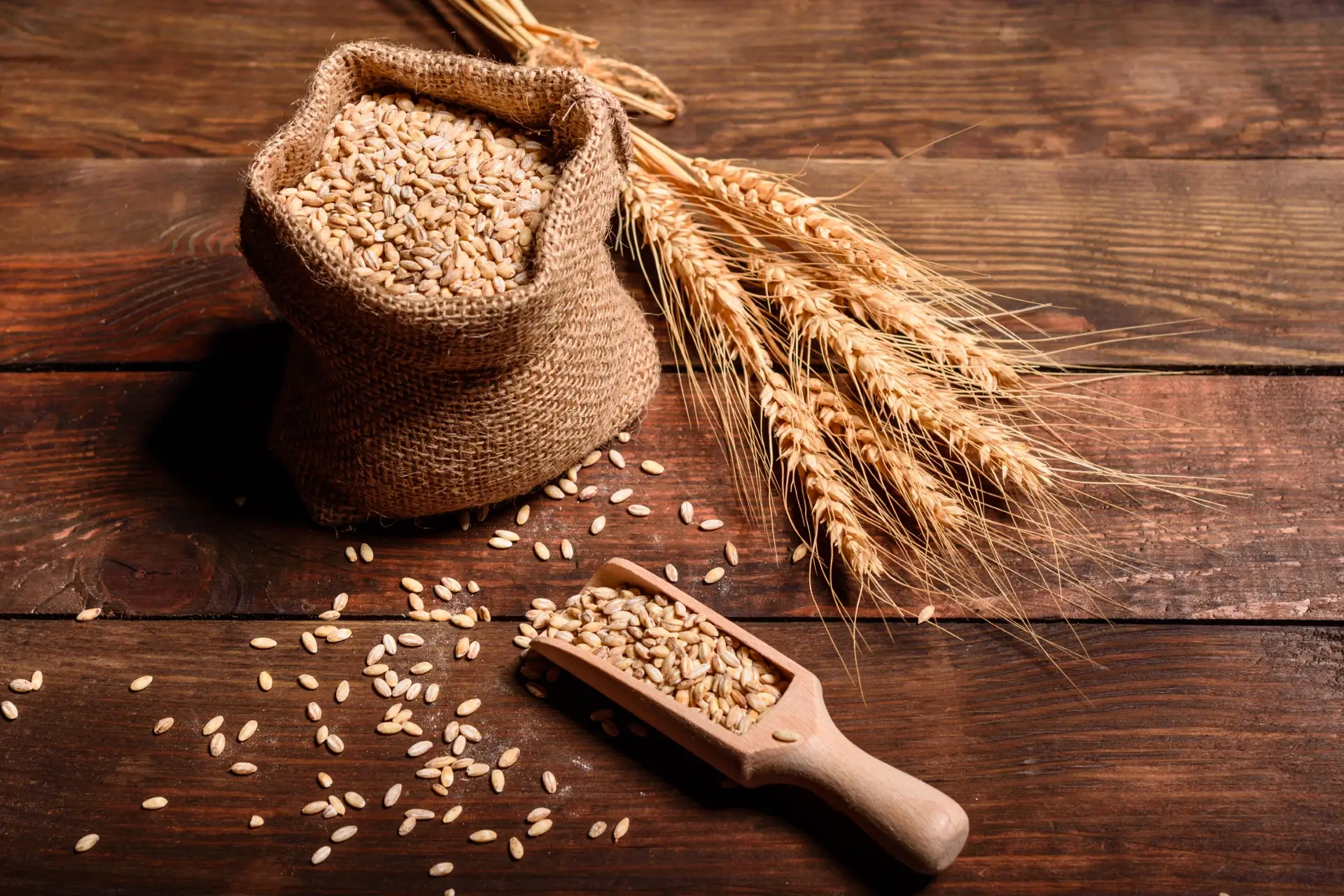
Nature Bio Foods’ Budaun project is Fairtrade certified allowing workers and farmers to earn fairer prices for their organic crops, and have control over their futures. Our Budaun project aligns with Fairtrade’s approach to empowering farmers and workers to have greater control over their lives and invest in their future. We fully support Fairtrade’s standards and associated norms, and we’re proud to integrate them into our business practices.
When you see the FAIRTRADE Mark on our products, you can trust that we’ve met internationally agreed-upon standards that have been independently verified. At NBF, we prioritize fairness and ethical practices in all aspects of our business, and our commitment to Fairtrade is an essential part of that.
We believe in empowering farmers and workers at NBF, which is why they have a strong voice at every level of trade. From managing their farms to contributing to our discussion forums, we’re dedicated to providing an equal platform for everyone. Our adherence to Fairtrade’s principles is not just about compliance; it’s a core value that guides our business.
Fairtrade is more than just a certification at NBF; it’s a way of doing business that puts people first. We’ve followed Fairtrade practices and implemented measures that provide better prices and working conditions for farmers and workers. By doing so, we’re helping to create a fairer deal for those who work hard to produce our products.

ROA Certified Organic Buduan Project
Cultivating Abundance, Sowing Sustainability: Regenerative Organic Agriculture, Replenishing the Earth’s Vitality

Soil Health
- Conservation Tillage
- Cover Crops & Follow Rotations
- No GMOs / Gene Editing and Synthetic Inputs
- No Soilless Systems
- Preference to Promote Biodiversity
- Rotational Grazing

Animal Welfare
-
- Freedom from Discomfort, Fear and Hunger
- Grass-Fed / Pasture-Raised
- Limited Transport
- No CAFOs
- Suitable Shelter

Social Fairness
- Capacity Building
- Democratic Organizations
- Fair Payments for Farmers and Good Working Conditions
- Living Wages and Long-Term Commitments
- No Forced Labor & Freedom of Association
- Transparency and Accountability
Nature Bio Foods’ Budaun Project is certified by the Regenerative Organic Alliance (ROA) for implementing regenerative agricultural practices on its farmland. By farming in accordance with ROA standards, Nature Bio Foods is helping to sequester carbon, build healthier communities, and produce more nutritious and abundant food. We believe that regenerative organic agriculture has the power to address several pressing issues, such as soil degradation, loss of biodiversity, climate change, and poverty. Our project in Budaun follows the principles of regenerative organic farming that focuses on building soil health, biodiversity, and ecosystem services through practices such as cover cropping, crop rotation, inter-cropping, composting, and agroforestry.
At NBF, we strive for a world that is free from toxic chemicals, factory farming, exploitation, income inequality, soil degradation, habitat destruction, pollution, short-term thinking, corporate bullying, greenwashing, and fake food. We achieve this by following the standards set forth by ROC.
Our goal at NBF is to bring together farmers, brands, policymakers, educators, researchers, and individuals to create a healthy food system that values and respects the land and animals, empowers people, and restores communities and ecosystems through regenerative organic farming practices and principles.
NBF places great value on the health of our interconnected planet and all of its inhabitants, both above and below ground. To ensure a healthy planet, abundant and nutritious food, and thriving people for generations to come, we continuously strive to improve the way we farm.
Budaun Project Certified BioSuisse and USDA Organic

Nature Bio Foods (NBF) is committed to promoting organic farming practices that benefit both farmers and the environment. In our project in Budaun, we provide farmers with the necessary knowledge, training, and resources to comply with Biosuisse’s rigorous organic farming standards. In our project in Budaun, we enable Biosuisse Organic by providing farmers with the necessary knowledge, training, and resources to comply with Biosuisse’s rigorous organic farming standards. We work closely with farmers to implement organic farming techniques that promote soil health, conserve biodiversity, and reduce the use of synthetic inputs. By enabling Biosuisse Organic, we help farmers in Budaun to cultivate high-quality, organic produce that meets the demands of consumers who value healthy, sustainable food options.

Nature Bio Foods’ Budaun Project is USDA organic certified. We adhere to strict organic farming practices that comply with the USDA National Organic Program (NOP) standards. We use only organic inputs for crop production, such as organic seeds, organic fertilizers, and organic pest management methods. Our team of trained farmers follows sustainable farming practices and works with nature to improve soil health, protect biodiversity, and promote ecosystem balance. By ensuring compliance with USDA organic standards, we aim to provide our customers with the highest quality organic produce while contributing to the well-being of the planet.
Organic Farms of Budaun, Uttar Pradesh
The Budaun project’s topography consists of a planned landmass with multiple rivers, such as Ganga, Ramganga, and Soth, providing high fertility to the land. The Tarai region also contributes to the district’s pleasant climate, making it an ideal location for the project.
Agricultural Characteristics
Soil Profile

The district’s soil profile is divided into three Agro-ecological situations, with the project area falling under AES-1, representing the mid-western plain zone. In this region, three types of soils are predominant: clay loams, sandy soils, and sandy loams. The soils of the region are mostly neutral to moderately alkaline and medium in organic content. The mid-western plain zone of the districts has light soil with medium fertility, such as:
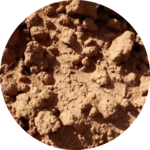
Clay Loam: Clay loam soil in the project found is a balanced mixture of clay, silt, and sand particles. It has good water-holding and nutrient-retaining capacity, making it suitable for a variety of crops. Clay loam soils can be sticky when wet and hard when dry, but they are generally fertile and support healthy plant growth.

Sandy Soil: Sandy soil is characterized by a high proportion of sand particles, resulting in excellent drainage but poor water-holding capacity. It drains water quickly and can dry out rapidly, which can be challenging for plants. Sandy soils are less fertile due to nutrient leaching, but they are suitable for crops that prefer well-drained conditions.
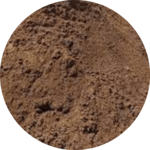
Sandy Loam: Sandy loam soil is a medium-textured soil with a higher proportion of sand particles than clay and silt. It offers a balance between drainage and water-holding capacity. Sandy loam soils have good water infiltration, moderate nutrient retention, and are considered fertile, making them suitable for various crops and relatively easy to work with.
Climate Condition
The Budaun project is located in the Mid Western Plain Zone of Uttar Pradesh and experiences rainfall from mid-June to mid-October, with an annual average of 882 mm. The average annual temperature in Budaun is 24.5°C (76.2°F). The hottest month of the year is May with an average temperature of 45.4°, while January is the coldest month, with an average temperature of 4.5°C.
Temp.
Minimum

4.5 °C
(Dec-Jan)
Maximum

45.4 °C
(May-June)
Humidity
Relative Humidity

89%
Rainfall
Average Rainfall

800-900 mm (Average)
Seasons
There are mainly three seasons.

Summer
(Mar-June)

Rainy
(July-Sep)

Winter
(Oct-Feb)
Farm Water Availability
Most of the area in the project is rainwater-dependent. Borewells are the primary sources of irrigation for the majority of crops. The Ground-Water level found within is 35-40 ft.
Nature of Farmers
Farmers are quite cooperative and agree to adopt new methods of farming to reduce the cost of production and increase their incomes.
Being less educated, they stay away from the reach of electronic media but the new generation of farmers has started using smartphones.

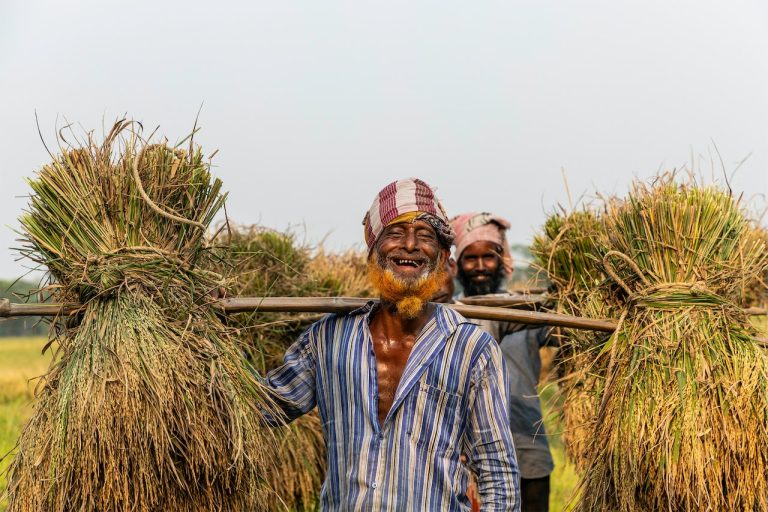

Growing Conditions
Most of the farmers in the project area are financially poor and illiterate, with an average landholding of less than 2 hectares. Therefore, they rely on their own farm resources and traditional methods, such as using animal power (bullocks and buffaloes) for ploughing. However, farmers with larger landholdings have access to various machines and are willing to share them with others for a minimum rent. Farmers store their own farm seeds for future sowing and replace them after three or four years. Agricultural activities are guided by the “Krishi Panchang,” with decisions regarding seed sowing, land preparation, transplanting, and pest and disease control based on the position of the Grah and Nakshatra.
Crop Details
Wheat and paddy are the primary cash crops grown in this area, and the farmers here have extensive experience cultivating these crops. In addition, the region’s farmers commonly grow the “Mentha” crop (spearmint), which is a popular cash crop due to its short growth period of about 80-90 days.
Kharif
- Basmati Paddy (Traditional, CSR-30, Type-3, Pusa-1509, Pusa 1637)
- Non-basmati Sarbati
- Non-Basmati Sona Masuri
- Pearl Millet
- Sesames
- Maize
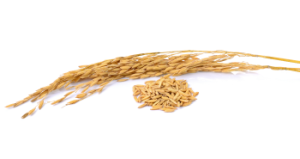
Rabi
- Wheat
- Musturd
- Lentil
- Garlic
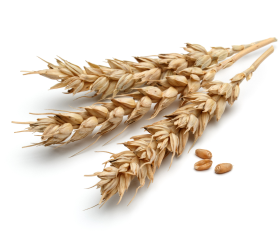
Zaid
- Mentha
- Maize
- Ground Nuts
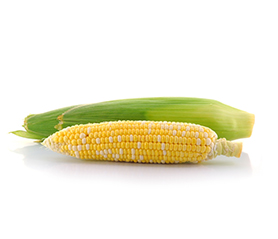
Statistics
NBF Supply Chain

NBF Supply Chain
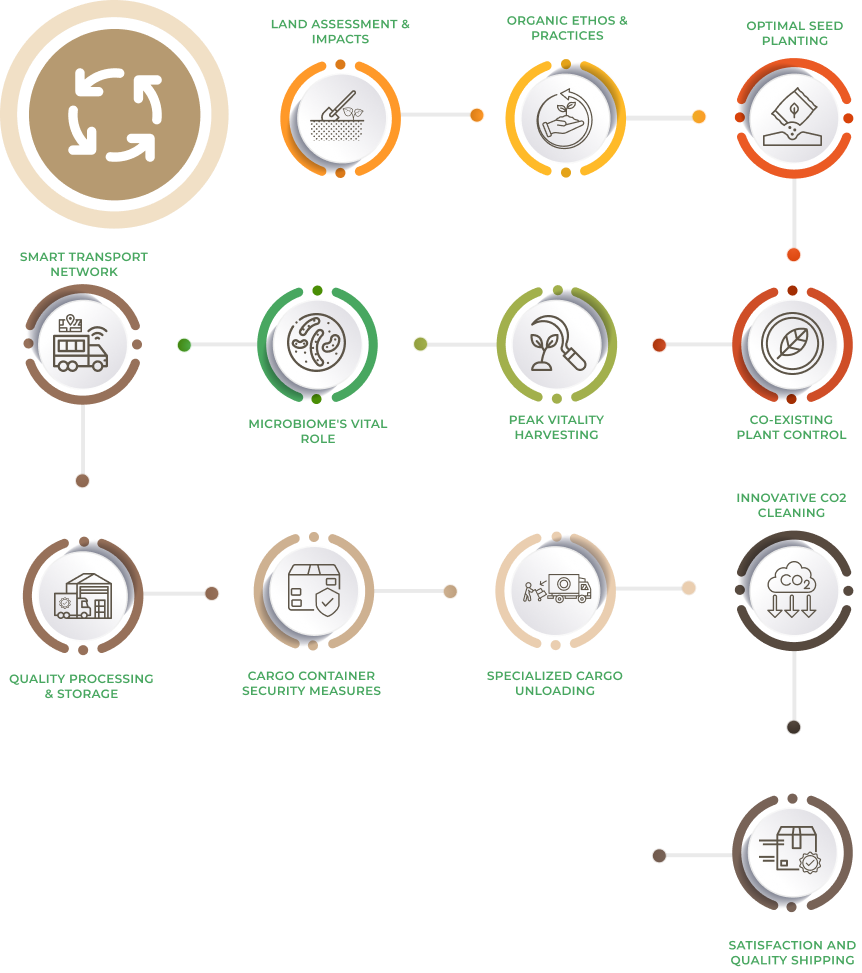
Transport Modes to Reach Budaun
Budaun might seem nothing more than a secluded small town at the first sight. However, you come across many monuments that reveal its rich history.

By Train
There are regular trains from other major cities of the country to Badaun. Nearest Railway Station is Budaun (BEM).

By Road
Budaun city acts as a junction for many national roads, which make the city one of the most important of the western UP. There are regular buses from other major cities of the country to Badaun as Capital of India is just 234 km via SH 18 and Eastern Peripheral Expressway.

By Air
You can a get flight to Kheria Airport on regular basis. Badaun is 149 km away from kheria airport (AGR), agra, uttar pradesh.

Places of Attraction in Budaun
Roza Ikhlas Khan
Roza Ikhlas Khan was constructed in 1094 Hijri (1690). The length of this Roza is 152 and width is 150 ft and Made of bricks. This mausoleum is a memorable building of Mughal period. Wife of Nawab Ikhlas Khan had constructed a Roza in memory of her husband (Ikhlas Khan). Which is known as Ikhlas Khan’s Roza.
[/mvc_ihe]Gauri Shankar Mandir
This temple situated at Budaun-Farukhabad Road near Mandi samiti. This temple founded in 2001 by Rastogi family. In this temple the shivalinga made by gold (Au) and para (Hg). This shivalinga called Rasling, this only Raslinga in North reason. There are many other small temple present in campus like Hanuman Ji, Sita-Ram ji, Krishna ji, Sani Bhagwan, Sai Baba many other.
[/mvc_ihe]

Elevation
It has an average elevation of roughly 177m.


River
Buduan is situated on the banks of the river Sot.


Soil
Two types of soils are mainly observed in the district- Sandy Soil and Clay Loam.
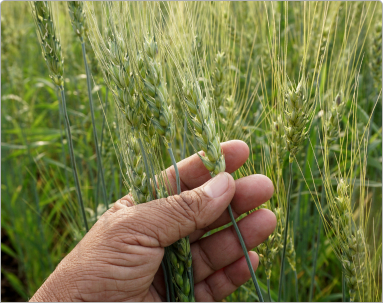

Crop
This zone is highly suitable to produce Wheat, Mustard, Lentil, Potato, Paddy, Sugarcane, Maize and Bajra.
Sustainability Efforts
Economic
RO Purifiers: Water Filtration Systems for every Household
|
|
900 | |
Advanced Water Purification System for Educational Institutions
|
|
5 | |
Transforming Classrooms: Digitized Learning Spaces
|
|
2 | |
Empowering Communities with Accessible Water Filtration Solutions
|
|
4 | |
Illuminating Streets with Environment-Friendly Solar Lighting
|
|
100 | |
Women's Empowerment through Entrepreneurial
Training Programs
|
|
435 | |
Empowering Young Women: Career Counseling for
Future Success
|
|
787 | |
Craftsmanship Unleashed: Skill Development in
Artisanal Handicrafts
|
|
675 | |
Social
| Fostering Educational Partnerships: Village School Adoption Program |
5 |
|
| Students Holistic Development |
1228 |
|
| Championing Menstrual Hygiene: Centers for Women's Well-being |
1 |
|
| Enhancing Women's Health: Distribution of Menstrual Hygiene Products |
8563 |
|
| Empowering Women through Education: Menstrual Hygiene Training Initiatives |
1163 |
|
| Nourishing the Future: Workshop on Child Nutrition and Well-being |
700 |
|
| Guiding the Leaders of Tomorrow: Mentoring Programs for Students |
1438 |
|
Environmental
| Cultivating the Earth: Advanced Training in Soil Regeneration |
454 |
|
| Towards a Plastic-Free Future: Comprehensive Reduce and Reuse Initiatives |
225 |
|
| Preserving Our Lifeline: Campaigns for Water Conservation and Stewardship |
465 |
|
| Agriculture in Harmony with Nature: Organic Farming workshops |
354 |
|
| Clean Village, Healthy Village: Promoting Cleanliness and Sanitation at the Grassroots Level |
764 |
|
Our Impact

Impact of our Farmers
Farmers employ various methods to enhance soil fertility, such as crop rotation, cover cropping, reduced tillage, and application of compost. By reducing fuel-intensive tillage, less soil organic matter is lost to the atmosphere, leading to carbon sequestration. This reduces greenhouse gases and helps to reverse climate change. Moreover, reduced tillage can improve soil structure and decrease the possibility of soil erosion.

Difference our People are Making
Our organization uses several processes such as converting land from conventional management to organic management, managing the entire surrounding system to ensure biodiversity and sustainability, and crop production with the use of alternative sources of nutrients such as crop rotation, residue management, and organic manures. We provide complete biological inputs to our crops.
We also manage weeds and pests through better management practices, physical and cultural means, and our teams supervise and manage these activities. This approach makes us an integral contributor to the cause of sustainability.

Contribution by our Customers
Consumers are becoming increasingly aware of food safety and environmental issues, and their concern for their own health, the environment, and worldwide crises has risen exponentially. Organic agriculture has always been a production option followed by a few farmers worldwide, but now it has become the only option for many consumers. Simply by consuming organic produce, consumers are contributing to the overall health of the planet and creating an impact.
